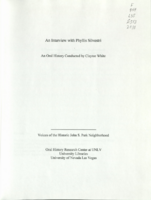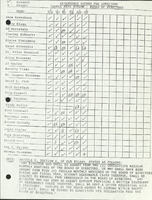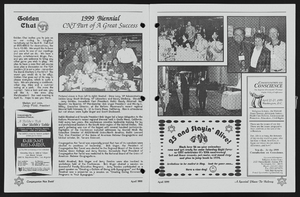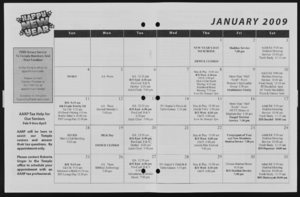Search the Special Collections and Archives Portal
Search Results

Transcript of interview with Phyllis Silvestri by Claytee White, January 11, 2010
Date
Archival Collection
Description
As a young woman, Phyllis Silvestri made the adventurous decision to move to the United States. She was bom in Canada and lived there until her early 20s. Over the next few years, Phyllis and her friend Mona logged many miles, worked and visited several states. By 1953, Phyllis had met and married Vincent Silvestri, who worked at Bingo Palace, now the Sahara Hotel and Casino. Soon they had their first child and had bought a home on Santa Rosa. A few years later they were building a new home in the John S. Park area. She proudly recalls her husband's attention to details such as including lots of built-in features and a bomb shelter that represents the era. Phyllis talks fondly of the neighborhood, but also recalls her children not being allowed to play with some of the neighborhood children because they were of Italian ancestry.
Text

Rena Lees interview, March 19, 1978: transcript
Date
Archival Collection
Description
On March 19, 1978, collector Bill Young interviewed Rena Lees (born October 15th, 1934 in Las Vegas, Nevada) at her home in Las Vegas, Nevada. In this interview, Rena Lees talks about growing up in Las Vegas and the activities she was involved in as a teenager. She also discusses her family and her career working at Sunrise Hospital.
Text

Interview with Robert Joseph Curran, July 18, 2005
Date
Archival Collection
Description
Text

Minutes from Temple Beth Sholom Board of Directors meetings, June 1988 - May 1989
Date
Archival Collection
Description
Meeting minutes include reports from committees of the board, correspondence, and balance sheets.
Text

Transcript of interview with Stan Irwin by Cork Proctor, October 24, 2003
Date
Archival Collection
Description
Stan Irwin shares details of his background, family, and early show business experiences. His life story spans many decades and includes attending NYU, doing stand-up comedy, flying during WWII, working at Club Bingo in Las Vegas, and building up the entertainment at the Sahara Hotel. Mr. Irwin comments on many aspects of the Las Vegas entertainment scene. He recalls many headliners that he worked with and shares anecdotes about several. The Beatles, Johnny Carson, Dinah Washington, Billie Holliday, Lena Home, and Pearl Bailey are just a few of the many outstanding performers that he brought to Las Vegas. Stan offers comments on racism in Las Vegas thirty and forty years ago, and gives his opinions on the Mob, Howard Hughes, prostitution, and dress codes in the fifties and sixties, among other things. He recalls how Las Vegas looked in the early days, mentions a cardiovascular health project for children that he's involved with today, and gives a little insight into staying fit at eighty-plus.
Text

Transcript of interview with Bobby Morris by Cork Proctor, September 7, 2004
Date
Archival Collection
Description
This interview conducted by Cork Proctor and is part of the Arnold Shaw Collection at UNLV University Libraries Special Collections. It has been added to the Southern Nevada Jewish Heritage Project with Mr. Morris?s permission. In this conversation, Morris reflects upon his career, how he got started as a musician, and the wide range of influential artists he has worked with over the years, as a drummer, musical director and talent manager. Stories include playing with Louis Prima, live and on his albums; serving as Elvis? musical director; filling in for Frank Sinatra?s drummer; entertaining Howard Hughes; and playing at President John F. Kennedy?s inauguration.
Text

Peter Guzman interview, September 10, 2018: transcript
Date
Archival Collection
Description
Interviewed by Claytee White. Born in Florida, family arrived in Las Vegas in 1969. Father worked in the service industry. Worked as realtor before becoming President of the Latin Chamber of Commerce. Vice chairman of Hope for Prisoners and Vice Chairman of Workforce Connection.
Text

Transcript of interview with David Straus and Heidi Straus by Barbara Tabach, November 6, 2015
Date
Archival Collection
Description
In this interview, the Straus? discuss the joys of growing up in Las Vegas during the 1960s and 1970s, and the changes within the community over time, especially in educational opportunities. Both talk about Joyce Straus? career as artist and art educator, and the influence she had on their lives. They also remember Heidi?s father, Jay Sarno, and the impact he had on the local gaming industry. There is also discussion of the founding of Congregation Ner Tamid, the role of Jewish women?s philanthropy within the community, as well as the establishment of The Meadows School.
Text


